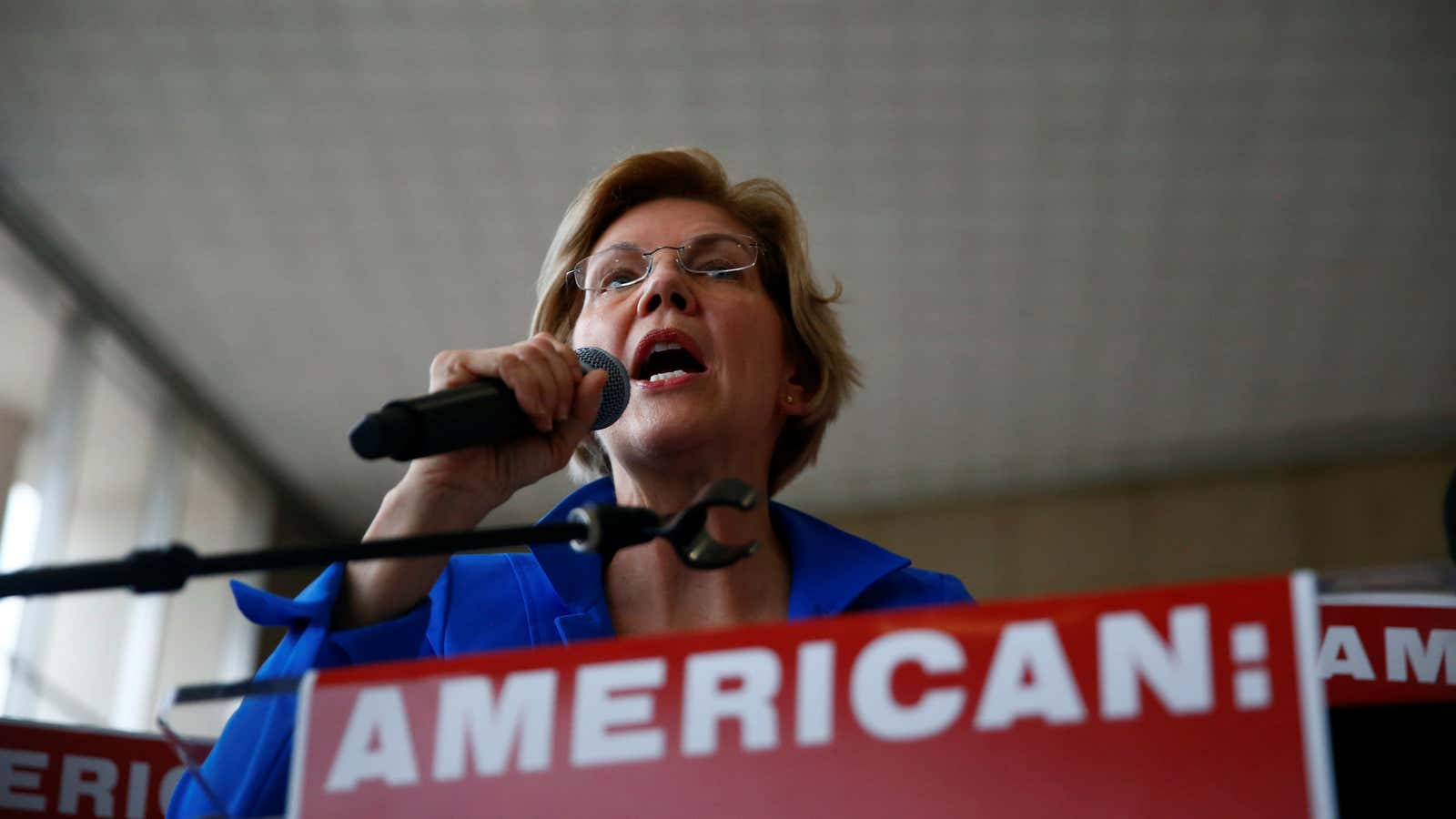Big Tech has a surprising ally in Elizabeth Warren, at least when it comes to digital payments. The US presidential candidate and three fellow democratic members of congress are proposing the Federal Reserve build a real-time payment system—something large tech companies have pushed for and big banks have tried to stop.
The US politicians are pushing for legislation that would require the central bank to build a real-time payment system that would speed up transactions. Such platforms are becoming de rigueur in Europe, leaving the US further behind, even as smartphones become commonplace and online commerce grows. The need to upgrade the country’s creaky transaction system is becoming more urgent.
That leaves American policy makers at something of a crossroads. While pretty much everyone agrees that real-time payments would be better, officials have to decide whether something as universally vital as payments should be a utility, or whether it should be placed in private hands that might be more innovative, but could be less aligned with the interests of the broader public.
The Fed has been weighing how to speed up digital payments, but efforts to give consumers and businesses access to the money in their bank accounts in real time hasn’t made much progress. This debate has played out online in recent months, following the Fed’s request for comment.
One faction thinks the Fed should do it, providing a kind of utility service. This group includes everyone from tech giants to a trucker association. Smaller banks say they don’t want to be beholden to larger lenders that could charge prohibitive prices.
The other main option is the private-sector system operated by The Clearing House (TCH), which is owned by around 20 of the biggest banks. TCH and the banks behind it say their own real-time payment network would be better to keep up with evolving technology. They say a Fed-run system would fragment the market and undermine the work they’ve already done.
The US’s biggest tech companies disagree:
“While the mobile internet is improving access to money, the speed of money may matter more, particularly for the half of Americans who live paycheck to paycheck,” member companies of Financial Innovation Now, a lobbying group which includes Amazon, Apple, and Google, wrote in a letter (pdf) to the Fed in December. “It does not make sense that, in our modern era of instant communications, it can still take up to five days for a paycheck to clear. This unnecessary delay causes many Americans to turn to high-cost check cashing or alternative financial services.”
For once, Warren’s arguments are remarkably similar to those made by Big Tech:
“People living paycheck-to-paycheck shouldn’t have to wait up to five days for a check to clear so that they can pay their rent, cover child care, or pick up groceries,” Senator Warren said in a statement. “Our bill would create a national, real-time payments system so that families have faster access to the money they earned and don’t have to pay overdraft fees or rely on a shady payday lender to make ends meet.”
Warren, a Massachusetts senator, has hardly been a close friend and ally of big tech companies—she has proposed breaking Facebook, Google, Amazon, and Apple into smaller pieces—but she has also aimed plenty of punches at big banks. She has proposed another crackdown on Wall Street, rebuilding the wall between investment banking and commercial banking, and has also advocated postal banking to provide low-cost basic financial services.
Warren isn’t the only one advocating for more utility-like banking services. Some financial inclusion experts also think that, generally speaking, for-profit models are prone to leaving behind some unprofitable segment of the broader population. A utility system, the thinking goes, would more likely to make sure everyone is looked after equally.
The legislation proposed by Warren, Maryland senator Chris Van Hollen and representatives Ayanna Pressley and Jesús García, of Massachusetts and Illinois, respectively, would require the Fed to finally take action. However it seems unlikely to get much traction as long as Republicans—likely to oppose the measure—control the Senate.
